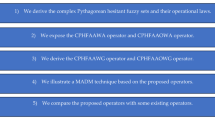Abstract
In the real world, there exist a lot of fuzzy data which cannot or need not be precisely defined. We distinguish two types of fuzziness: one in an attribute value itself and the other in an association of them. For such fuzzy data, we propose a possibility-distribution-fuzzy-relational model, in which fuzzy data are represented by fuzzy relations whose grades of membership and attribute values are possibility distributions. In this model, the former fuzziness is represented by a possibility distribution and the latter by a grade of membership. Relational algebra for the ordinary relational database as defined by Codd includes the traditional set operations and the special relational operations. These operations are classified into the primitive operations, namely, union, difference, extended Cartesian product, selection and projection, and the additional operations, namely, intersection, join, and division. We define the relational algebra for the possibility-distribution-fuzzy-relational model of fuzzy databases.
Similar content being viewed by others
References
Buckles, B., and Petry, F. (1982). A Fuzzy Model for Relational Databases.Fuzzy Sets and Systems, 7, 213–226.
Codd, E.F. (1970). A Relational Model of Data for Large Shared Data Banks.Comm. ACM, 13, 377–387.
Codd, E.F. (1972). Relational Completeness of Data Base Sublanguages. In R. Rustin, (Ed.),Data Base Systems. Englewood Cliffs, NJ: Prentice-Hall, pp. 65–98.
Date, C.J. (1977).An Introduction to Database Systems, 2nd ed. Reading, MA: Addison-Wesley.
Dubois, D., and Prade, H. (1980).Fuzzy Sets and Systems—Theory and Applications. New York: Academic Press.
Prade, H., and Testemale, C. (1984). Generalizing Database Relational Algebra for the Treatment of Incomplete or Uncertain Information and Vague Queries.Information Sci., 34, 115–143.
Raju, K.V.S.V.N., and Majumdar, A.K. (1988). Fuzzy Functional Dependencies and Lossless Join Decomposition of Fuzzy Relational Database Systems.ACM Trans. Database Systems, 13, 129–166.
Rundensteiner, E., Hawkes, L.W., and Bandler, W. (1989). On Nearness Measures in Fuzzy Relational Data Models.Int. J. Approximate Reasoning, 3, 267–298.
Shenoi, S., Melton, A., and Fan, L.T. (1990). An Equivalence Classes Model of Fuzzy Relational Databases.Fuzzy Sets and Systems, 38, 153–170.
Tahani, V. (1977). A Conceptual Framework for Fuzzy Query Processing—A Step toward Very Intelligent Database Systems.Information Process. Management, 13, 289–303.
Ullman, J.D. (1982).Principles of Database Systems, 2nd ed. Rockville, MD: Computer Science Press.
Umano, M., Fukami, S., Mizumoto, M., and Tanaka, K. (1980). Retrieval Processing from Fuzzy Databases. Technical Reports of IECE of Japan, Vol. 80, No. 204 (on Automata and Languages), pp. 45–54, AL80-50 (Japanese).
Umano, M. (1982). FREEDOM-0: A Fuzzy Database System. In M.M. Gupta and E. Sanchez (Eds.),Fuzzy Information and Decision Processes. Amsterdam: North-Holland, pp. 339–347.
Zadeh, L.A. (1965). Fuzzy Sets.Information and Control, 8, 338–353.
Zadeh, L.A. (1971). Similarity Relations and Fuzzy Orderings.Information Sci., 3, 177–200.
Zadeh, L.A. (1975). The Concept of a Linguistic Variable and Its Application to Approximate Reasoning.Information Sci., 8, 199–248, 301–357;9, 43–80.
Zadeh, L.A. (1978). Fuzzy Sets as a Basis for a Theory of Possibility.Fuzzy Sets and Systems, 1, 3–28.
Zemankova-Leech, M., and Kandel, A. (1984).Fuzzy Relational Data Bases—A Key to Expert Systems. (Köln, Germany): TUV Rheinland.
Author information
Authors and Affiliations
Rights and permissions
About this article
Cite this article
Umano, M., Fukami, S. Fuzzy relational algebra for possibility-distribution-fuzzy-relational model of fuzzy data. J Intell Inf Syst 3, 7–27 (1994). https://doi.org/10.1007/BF01014018
Issue Date:
DOI: https://doi.org/10.1007/BF01014018




